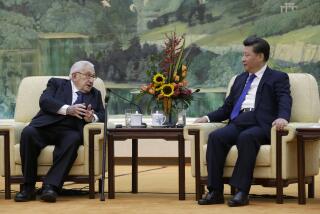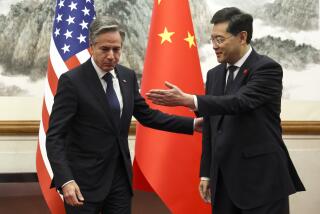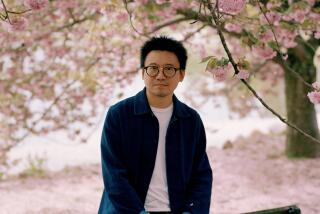Huang Hua dies at 97; former Mao translator, diplomat
- Share via
Huang Hua, a former translator for Mao Tse-tung who oversaw China’s formation of diplomatic ties with the United States in 1979, died Wednesday in Beijing. He was 97.
State broadcaster CCTV said Huang died of an undisclosed illness.
Huang, who was named ambassador to the United Nations in 1971, helped lay the foundation of China’s modern foreign policy, meeting secretly with U.S. National Security Advisor Henry Kissinger and helping draft the announcement of President Nixon’s groundbreaking visit to the country in 1972.
As foreign minister from 1976 to 1982, Huang oversaw the formation of diplomatic ties with Washington in 1979 and accompanied leader Deng Xiaoping on his tour of the United States that year.
Born in 1913, Huang was educated at an American-funded university in Beijing. He joined the then-underground Communist Party in 1936 and was one of Mao’s English translators in the years before the 1949 communist seizure of power.
Huang accompanied American journalist Edgar Snow on a reporting trip to the countryside to interview Mao and helped translate their talks. Snow turned his accounts into “Red Star Over China,” a bestselling book that offered a window into China.
Huang was increasingly pivotal in China’s foreign relations at a time when the communist state was largely isolated and battling for diplomatic recognition with Chiang Kai-shek’s U.S.-allied Nationalists on Taiwan.
In the early 1950s, Huang was part of the Chinese delegation to drawn-out Korean War peace talks that eventually resulted in the 1953 armistice still in force.
In 1958, he took part in tentative initial contacts with the United States in Warsaw that at the time were the only conduit for direct contacts between the sides.
Huang, who served as ambassador to Ghana, Egypt and Canada, was the only Chinese ambassador who was not called home for re-education during the Cultural Revolution of 1966-76.
More to Read
Start your day right
Sign up for Essential California for the L.A. Times biggest news, features and recommendations in your inbox six days a week.
You may occasionally receive promotional content from the Los Angeles Times.







